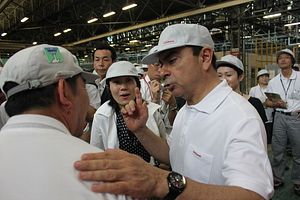The long serving boss of Nissan, Carlos Ghosn, was arrested in Tokyo on suspicion of falsifying personal income on company financial statements presented to Japanese regulators. After a months-long internal probe prompted by whistleblowers, Ghosn, 64, is being held at a detention center on charges of under-reporting income by $44 million over five years and misusing company funds for personal use.
Nissan board member Greg Kelly was also arrested on suspicion of aiding Ghosn in concealing the foreign accrued income. Tokyo prosecutors are believed to have seized email evidence of Ghosn instructing Kelly to understate his pay packet and to falsify financial wrongdoing in securities reports to the Tokyo Stock Exchange. At the same time Kelly is said to have assigned two staff, one in charge of legal affairs and a senior executive, to purchase and remodel luxury residences overseas in Lebanon and Brazil using company investment funds. It’s suspected the misreporting went on undetected for as long as it did through the cooperation of a small group of close aides.
In the 1990’s Ghosn shot to worldwide fame and became a prominent public figure in Japan after achieving what was considered to be an impossible task: saving Nissan from the brink of bankruptcy. In 1999, during Nissan’s financial woes, they welcomed life-saving investment from Renault, which now own 43 percent of Nissan. For two decades Ghosn was the mastermind behind the largest strategic union of three auto companies — Nissan Motors, Renault, and Mitsubishi Motors — to help compete against rivals General Motors, Toyota, and Volkswagen.
The scandal has rocked the auto industry and serves as a wake up call regarding the secrets of the upper ranks of corporate management. In Nissan’s press conference, interim CEO Hiroto Saikawa said the turning point for Ghosn’s downfall was in 2005 when Ghosn took on the CEO post at Renault while serving concurrently as the CEO of Nissan. At the time the move gained Ghosn a reputation as the hardest working businessman alive and earned him nickname “Mr. 7/11” for his Japanese work ethic. Ghosn was even awarded an honor by Emperor Akihito in 2004 in recognition for his achievements at Nissan.
However, Saikawa stressed the main incentive for the misbehavior was Ghosn being handed too much unchecked authority over a long period of time. While Saikawa acknowledged Ghosn’s leadership as contributing to Nissan’s revival he criticized the greed that led Ghosn to turn a blind eye to the difference between the companies’ money and his own money.
While the full extent of the allegations have not been released, what we do know is that the investigation, which began over the summer, interviewed over 10 whistleblowers. The suspected violations paint a picture of a negligent internal check and balance system that enabled Ghosn to set director bonuses in accordance to their performance. It’s possible that Ghosn and Kelly used this to serve their self-interests.
Meanwhile, Nissan provided Ghosn homes in Rio De Janeiro, Paris, Beirut, and Amsterdam without paying rent and failed to report these benefits in annual financial statements. Nissan also failed to report Ghosn’s earnings from stock appreciation rights. Also not mentioned were additional income and benefits of executive compensation such as $886,000 of earnings from a Dutch subsidiary. Prosecutors are building a case against Nissan as a publicly listed company that carries an approximate $6 million fine.
In Japan, under-reporting income carries a 10 year jail sentence and a fine of up to $89,000. All residents in Japan earning over 20 million yen (roughly $180,000) a year from domestic and overseas sources are legally obligated to report their income to the Japanese tax office. Under the criminal justice reforms introduced in July, whistleblowers who report company malpractice are entitled to greater safety protections and plea bargaining options such as a reduced sentence.
Saikawa announced immediate changes at Nissan, promising a new stage of corporate governance including a special committee made up of outside directors to establish remuneration boundaries for directors.
Nissan held an emergency board meeting where the majority voted to remove Ghosn and Kelly from their posts. However, Renault appointed a temporary deputy executive chief and confirmed Ghosn would remain as its chairman and chief executive.

































